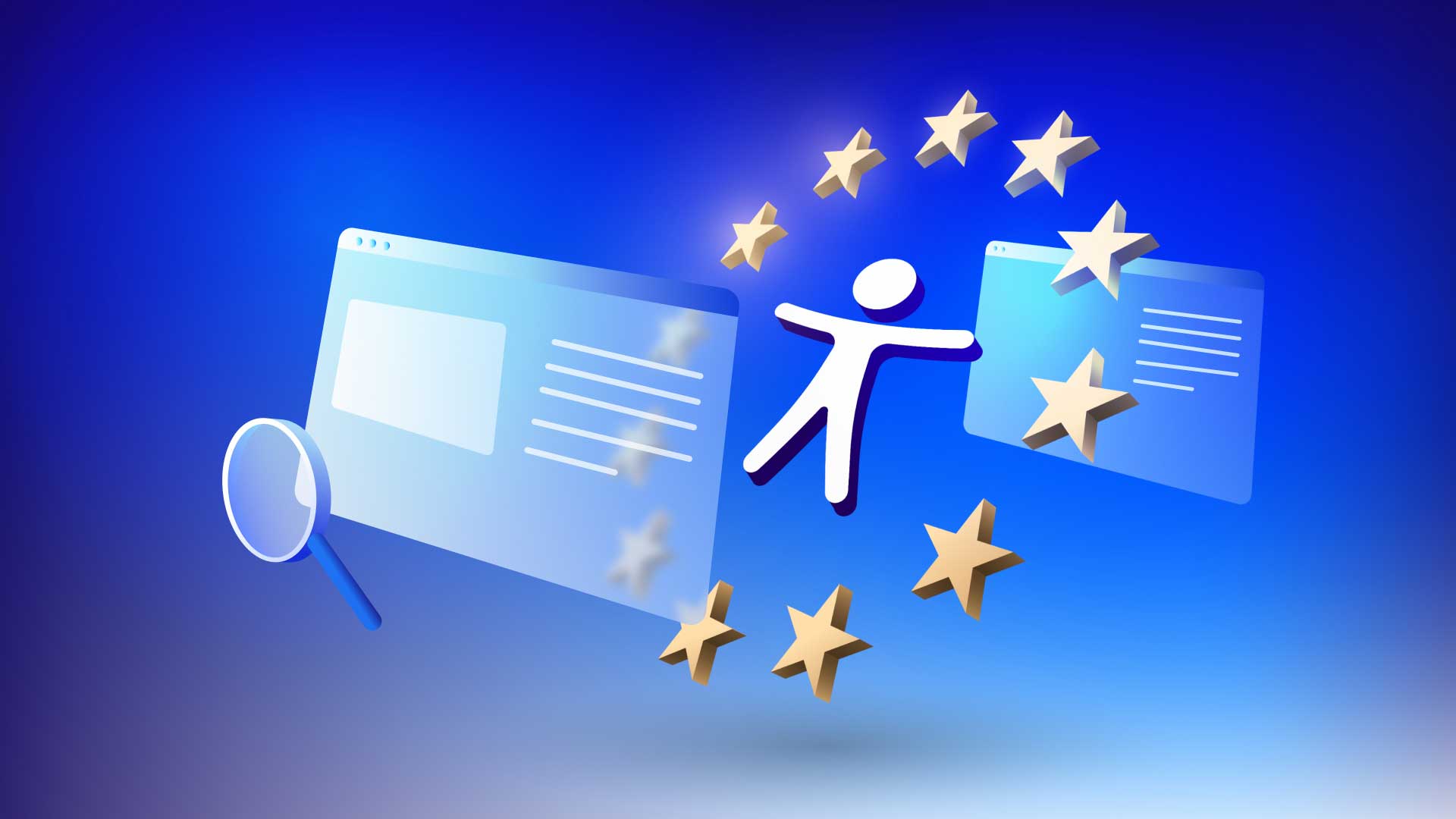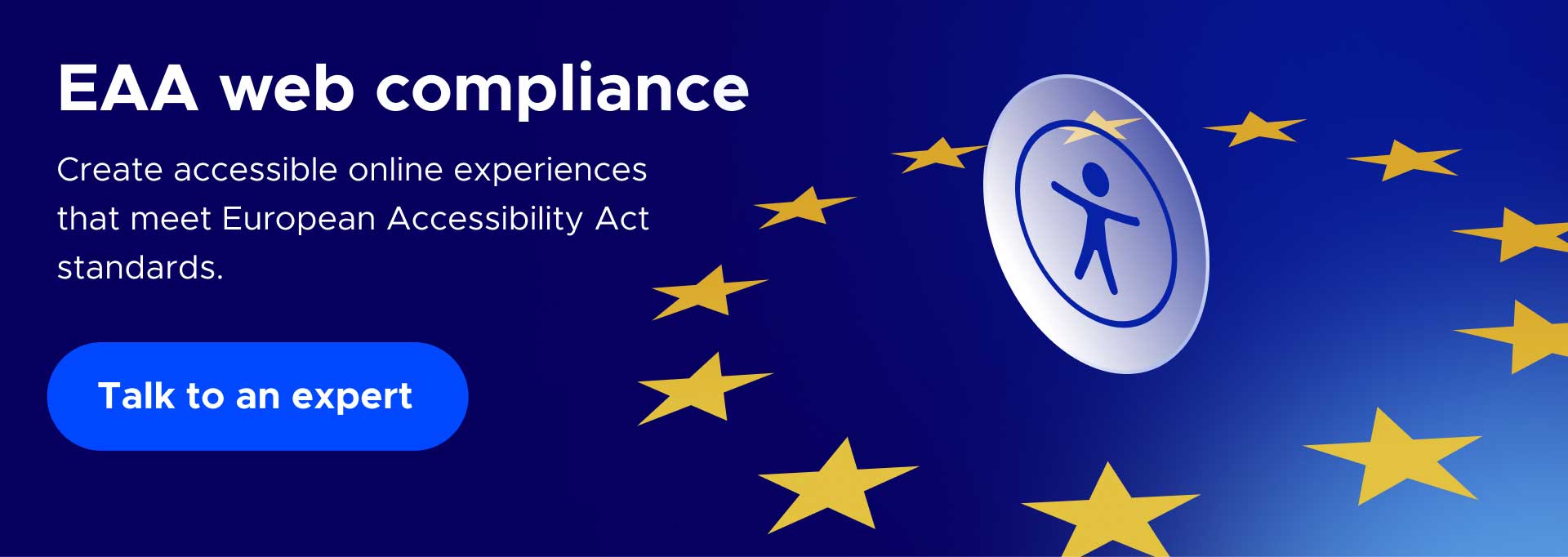The European Accessibility Act (EAA): Planning for 2025

With the European Accessibility Act (EAA) set to roll out in 2025, could this be the turning point for better web accessibility within the EU’s private sector?
For several years now, the EU’s public sector has reaped the advantages of the European Web Accessibility Directive, a law requiring that publicly-funded websites in the EU adhere to the WCAG 2.1 standards.
However, what has been missing is a piece of legislation that targets the private sector in the EU. Until now, the private sector has largely been exempt from any legislation regarding web accessibility. This gap in accessibility between the public and private sector has highlighted the need for more comprehensive measures.
This is where the upcoming European Accessibility Act (EAA) steps in, aimed to bridge this gap by introducing robust legislation for the private sector.
What is the EAA?
The EAA is the European Union’s latest legislation, set to be implemented in 2025. Its goal is to ensure that people with disabilities and older individuals can easily access a wide range of services and products, including websites, apps, online shopping, banking, and transportation. Previously, laws primarily targeted public sector websites, but the EAA expands its reach to include private sector offerings such as:
- E-commerce platforms
- Computers and operating systems
- Payment terminals and self-service kiosks
- Mobile phones and other digital communication tools
- Online video streaming and TV services
- Banking services
- Telephone services
- eBooks
However, there are exceptions for small businesses, which can claim an undue burden exemption if they have 10 or fewer employees or generate less than two million euros in annual revenue. This move by the EU aims to create a more inclusive and consistent marketplace for accessible products and services across member states.
Fact: The goal of the EAA is to help everyone get access to the products and services they need, no matter where they are in the EU. As a directive, it means it mandates web accessibility but leaves it to the Member States of the European Union to decide how they want to reach EAA accessibility legislation.
Why does the EAA matter?
With 135 million individuals in the EU living with disabilities who may encounter daily hurdles in accessing digital products and services, the EAA presents itself as the European Commission’s solution to this issue of inaccessibility.
By setting rules that require businesses to make their products and services more accessible, the EAA helps to break down these digital barriers. This means that more people can independently access the online world, without needing extra support.
When must private companies be ready for the EAA?
The European Accessibility Act is at an early stage of implementation, having been formally adopted by the EU in 2019. EU member states are given an extended period to integrate the necessary accessibility modifications.
For the transposition phase, by June 28, 2022, member states are expected to have a concrete strategy for transposing the European Accessibility Act into their domestic laws.
For implementation, by July 28, 2025, the laws of member states must enforce these requirements.
What products and services does the EAA impact?
The European Accessibility Act (EAA) has a wide scope aimed at making a variety of products and services more accessible for people with disabilities across the European Union. Its reach extends to digital environments and physical products, including but not limited to:
1. Digital services: This includes websites and mobile apps from both public and private sectors, ensuring they are accessible to people with various disabilities.
2. e-Commerce: Online shopping platforms are required to be accessible, making it easier for individuals with disabilities to purchase goods and services online.
3. Electronic devices: The EAA covers devices such as smartphones, computers, and TVs, requiring them to have features that are accessible to users with disabilities.
4. Banking services: ATMs, banking apps, and other financial services must be designed to be accessible to everyone, including those with visual, hearing, or physical impairments.
5. Transportation: The Act includes provisions for accessible ticketing, check-in systems, and information for air, bus, rail, and waterborne passenger transport services.
6. Media: Audiovisual media services, including television broadcasts and related consumer equipment, must ensure accessibility for individuals with disabilities.
7. Publishing: E-books and related e-reading devices are required to be accessible, ensuring that individuals with disabilities can access written content.
By covering these areas, the EAA aims to remove barriers and create a more inclusive society where people with disabilities have equal access to information, services, and products, enhancing their independence and participation in society.
What is the EN 301 549 in relation to the EAA?
EN 301 549 is a set of standards that specifies the requirements for making digital products and services accessible to all users, including those with disabilities. These standards can be seen as a rulebook that designers, developers, and manufacturers can follow to ensure their websites, apps, and other digital tools can be easily used by people who might have visual, hearing, motor, or cognitive impairments.
EN 301 549 is particularly important in the European Union, as it supports laws like the Web Accessibility Directive and the European Accessibility Act, helping to make the digital world more inclusive. So, whether it’s a government website or an app from a private company, EN 301 549 guides how to build them so everyone can use them without barriers.
Did you know? Seven out of ten Europeans think that enhancing the accessibility of products and services would significantly benefit the lives of people with disabilities, the elderly, and others who require accessible features.
What impact will the EAA have for businesses?
Failing to adhere to the EAA legislation could have significant implications for businesses operating within the European Union. Non-compliance could lead to legal challenges, fines, and a tarnished brand reputation. Businesses might find themselves at a competitive disadvantage, as accessibility becomes a benchmark for quality and inclusivity in the digital marketplace.
Failing to align with the EAA’s requirements risks alienating a substantial portion of the consumer base, particularly the 135 million individuals in the EU living with disabilities, as well as the elderly population seeking accessible digital solutions.
On the flip side, businesses that proactively embrace the EAA stand to gain numerous benefits. Compliance not only opens up access to a wider audience but also enhances customer satisfaction and loyalty by providing an inclusive user experience.
Accessible design often leads to overall better usability for all customers, not just those with disabilities. Furthermore, aligning with EAA standards can position a company as a socially responsible leader, enhancing its brand image and attractiveness to consumers who value inclusivity and ethics in the brands they support.
What steps can you take to prepare for the European Accessibility Act 2025?
Preparing for the European Accessibility Act (EAA) by 2025 involves strategic planning and proactive steps to ensure compliance and leverage the opportunities it presents. Here are three essential actions businesses can take:
STEP 1: Engage with web accessibility experts
Consulting with professionals who specialize in web accessibility can provide you with invaluable insights into the current best practices, potential pitfalls, and innovative solutions to complex accessibility challenges. These experts can offer tailored advice that aligns with the unique needs of your business and the specific requirements of the EAA.
STEP 2: Invest in accessibility education for your team
Building a culture of inclusivity starts with education. By providing your staff with training on web accessibility best practices, you equip them with the knowledge and skills needed to contribute to the creation of accessible content. This not only enhances your compliance efforts but also fosters an environment where accessibility is considered a priority in every project.
STEP 3: Allocate resources for accessibility initiatives
Planning for web accessibility should be an integral part of your business strategy, which includes allocating adequate budget and resources for necessary upgrades. This forward-looking approach ensures that you can implement accessibility features systematically, without the need for costly retrofits.
STEP 4: Monitor the evolution of the EAA
The regulatory landscape is dynamic, with the EAA’s implementation guidelines and requirements expected to evolve over time. Staying abreast of these changes is vital. By doing so, you can anticipate adjustments in compliance requirements and adapt your accessibility strategy accordingly.
Adhering to the EAA and digital accessibility in the broader context requires a blend of technical knowledge, strategic planning, and a deep understanding of the user experience for people with disabilities. By taking a comprehensive and informed approach, businesses can not only meet the legal requirements of the EAA they can also contribute to a more accessible and equitable digital world.
Prepare for the EU Accessibility Act 2025 with UserWay
As we move forward, the implementation of the EAA will set a precedent for other regions to follow. It’s a call to action for all private companies to prioritize accessibility, embedding it into the core – and the thinking – behind their products and services.
UserWay is committed to helping you comply with the EAA and other regulatory guidelines with a suite of solutions—including the AI-powered Accessibility Widget that can identify and rectify your accessibility errors and help you reach compliance. Ready to plan ahead? Contact us to get EAA-ready.
FAQs
What is EAA compliance?
The European Accessibility Act (EAA) stipulates that various products and services, encompassing numerous digital technologies, be made accessible to individuals with disabilities. This legislation, applicable across EU member states, seeks to harmonize the divergent accessibility standards that currently exist among European countries.
Which organizations are exempt from the new accessibility law?
Although the EAA encourages all businesses to comply with its provisions, small and medium businesses with less than 10 workers and an annual turnover of no more than 2 million Euros and companies in which compliance with the EAA would impose a disproportionate burden are fully exempt.
Is the UK part of the EU?
The United Kingdom is not part of the European Accessibility Act (EAA) as it is no longer a member of the European Union (EU), having left the EU on 31 January 2020. The EAA is an EU directive, and thus its requirements apply to EU member states.





Share